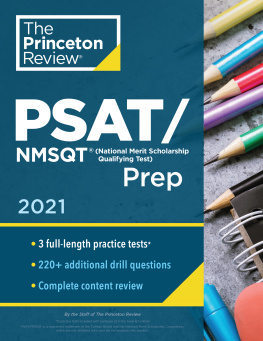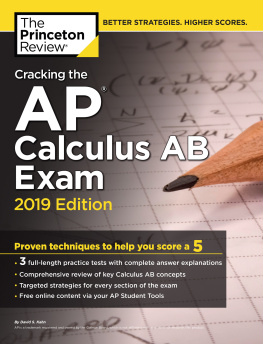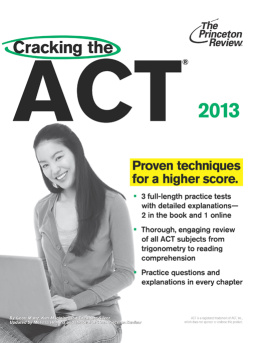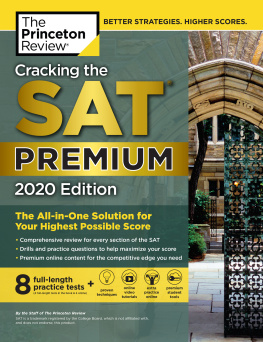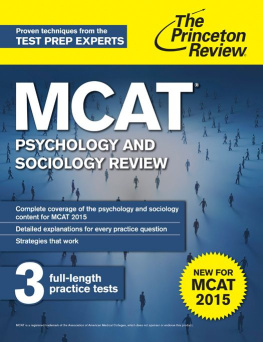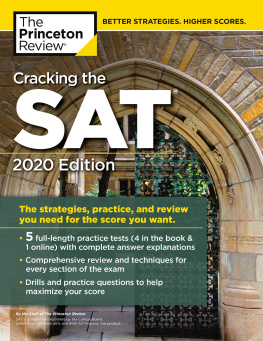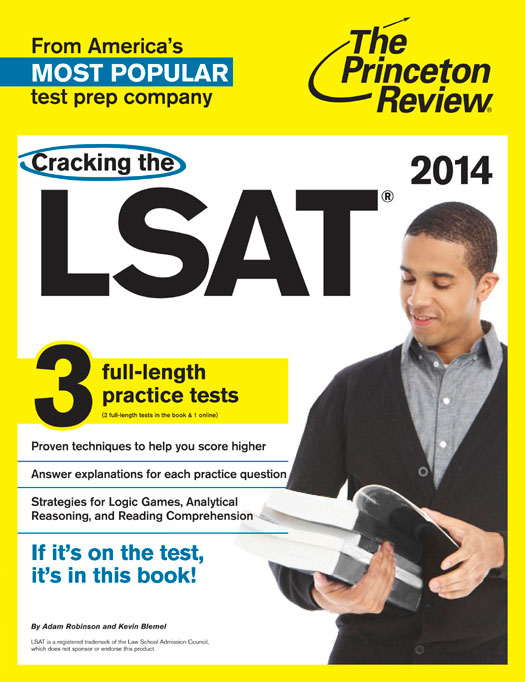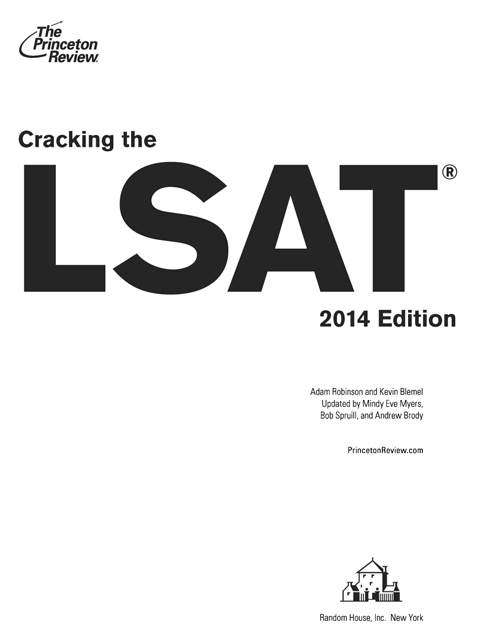
Editorial
Robert Franek, VP Test Prep Books, Publisher
Selena Coppock, Senior Editor
Calvin Cato, Editor
Meave Shelton, Editor
Kristen OToole, Editor
Random House Publishing Team
Tom Russell, Publisher
Nicole Benhabib, Publishing Manager
Ellen L. Reed, Production Manager
Alison Stoltzfus, Managing Editor
The Princeton Review
111 Speen Street, Suite 550
Framingham, MA 01701
E-mail:
Copyright 2013 by TPR Education IP Holdings, LLC
Cover art Jonathan Pozniak
All rights reserved. Published in the United States by Random House LLC, New York, and in Canada by Random House of Canada Limited, Toronto. Originally published by Villard Books, a division of Random House, Inc., 1989.
A Penguin Random House Company
Terms of Service: The Princeton Review Online Companion Tools (Online Companion Tools) for the Cracking book series and 11 Practice Tests for the SAT & PSAT are available for the two most recent editions of each book title. Online Companion Tools may be activated only once per eligible book purchased. Activation of Online Companion Tools more than once per book is in direct violation of these Terms of Service and may result in discontinuation of access to Online Companion Tools services.
LSAT directions copyright 1989 Law School Admission Council, Inc. All rights reserved. Reprinted by permission of Law School Admission Council, Inc.
Permission has been granted to reprint portions of the following:
The Export of Hazardous Wastes: Issues and Policy Implications, by C. E. Davis and J. D. Hagen, taken from International Journal of Public Affairs, Vol. 8, No. 4, 1986.
Employee Drug-Testing Issues Facing Private Sector Employees, by Steven O. Todd, taken from North Carolina Law Review, Vol. 65, No. 4, 1987.
The Right of Publicity Revisited: Reconciling Fame, Fortune and Constitutional Rights, by Jane Gross, taken from Boston University Law Review, Vol. 62, No. 4, 1982.
An Economists Perspective on the Theory of the Firm, by Oliver Hart, 89 Columbia Law Review 1957. 1989 by the Directors of the Columbia Law Review Association, Inc. All rights reserved. Used by kind permission from Professor Hart and Columbia Law Review. Several minor editorial changes were made to make the excerpts conform to LSAT passage specifications. Mr. Hart is a professor of economics at M.I.T.
The Princeton Review is not affiliated with Princeton University.
eBook ISBN: 978-0-307-94591-4
Trade Paperback ISBN: 978-0-307-94567-9
Editor: Kristen OToole
Production Editor: Harmony Quiroz
Production Coordinator: Sandra Schmeil
2014 Edition
v3.1
Acknowledgments
A successful LSAT program is a collaborative effort. Wed especially like to thank Andrew Brody, Akhil Sheth, Chad Chasteen, and Jennifer Wooddell for their expertise.
A very special thanks to Oliver Hart, professor of economics at M.I.T., and to Debora Davies and the folks at Columbia Law Review for their generous permission to quote an excerpt from an article by Professor Hart.
Special thanks to Adam Robinson, who conceived of and perfected the Joe Bloggs approach to standardized tests and many of the other successful techniques used by The Princeton Review.
Contents
Foreword
Dear Prospective Law Student:
Congratulations on your decision to purchase The Princeton Reviews Cracking the LSAT. This self-study guide will help you achieve your highest possible score on the LSATarguably the most significant single factor in law school admissions decisions.
While most applicants understand the importance that the LSAT plays in their law school applications, many are unaware that the score they receive can have far-reaching consequencesoften determining much more than just which law school they will attend. For example, many law schools consider LSAT scores when awarding merit scholarships and grants. Given that the average full-time Juris Doctor degree costs more than $150,000, a high score on the LSAT may well translate into tens of thousands of dollars in financial aid that can significantly reduce your law school debt upon graduation.
The LSAT purports to gauge your reading comprehension, reasoning, and analytical skills in an effort to predict your ability to survive a demanding law school curriculum. Those who hone their LSAT test-taking skills usually score the highest. Indeed, a strong LSAT score can be as much an indication of a strong work ethic as it is of intellect.
So invest the time and master The Princeton Reviews proven test-taking strategies. While that investment begins with Cracking the LSAT, it should not end there. To get the most out of your self-study, take advantage of the many resources that accompany this book. By registering your book at PrincetonReview.com/cracking, you can gain access to additional practice tests, personalized score reports, online exercises, tutorials, and more.
The Princeton Reviews master instructors are devoted to sharing their wisdom and inspiration so that you can conquer the LSAT. Cracking the LSAT and its online supplement are the fruits of their efforts. I firmly believe that The Princeton Review, with its personalized instruction and test-taking techniques, is the very best way for you to prepare comprehensively for the LSAT.
Good luck!
Sincerely,
Donald W. Macaulay, Esq.
President and Founder, Law Preview
So Much More Online!

More Lessons
- Step-by-step guide to solving difficult Games and Argument problems
- Tutorials that put our strategies into action
- Interactive, click-through learning
- Overview of the question types you will find on the LSAT
More Practice
- Sample Reading Comprehension passages and problems
- Many types of Arguments
- Full-length practice tests
More Scores
- Automatic scoring for online tests
- Instant scoring for your book tests
- Performance analysis to tell you which topics you need to review
More Good Stuff
- Plan your review sessions with study plans based on your schedule4 weeks, 8 weeks, 12 weeks
- Sign up for e-mail tips and tricks
then Law School!
- Detailed profiles for hundreds of law schools help you find the school that is right for you
- Information about financial aid and scholarships
- Top 10 ranking lists including Quality of Professors, Most Competitive Students, Best Career Prospects, and tons more
Chapter 1
General Information
and Strategies
In this chapter, were going to give you an overall preparation plan for the LSAT. Before we hit you with some test-taking techniques, we want to make sure that you know all that we know about the LSAT itself. Well start with a few pages worth of information on the test. Make sure you read all this info carefully so youll know exactly what youre up against.


